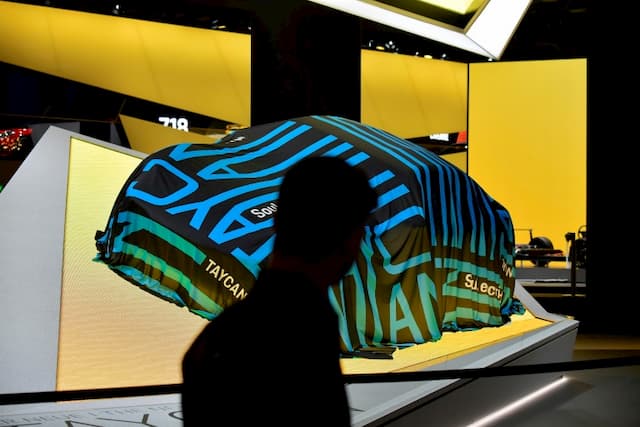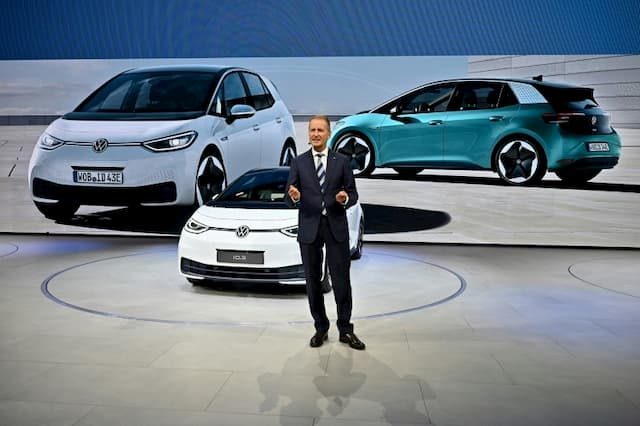Volkswagen ID.3, Taycan … The German Car Flies in Frankfurt Motor Show

On the occasion of the Frankfurt Motor Show, German brands will be able to take advantage of the absence of foreign competitors to present their electric models.
The new German electric cars will be the stars of the Frankfurt Motor Show, which opened Tuesday 10th September 2019 to the press, in a gloomy environment and as manufacturers fear the shock of the new European ceilings of CO2.
On Monday night, hundreds of journalists gathered to discover a new Volkswagen electric model that the German brand considers both historic and crucial for its future, the ID.3.
This world-first compact sedan, which Volkswagen compares to its famous Ladybug, is expected to spark public curiosity in a country where the powerful automotive industry is a source of national pride.
Hundreds of thousands of visitors are expected from Thursday until the 22nd September.
The Volkswagen Group also unveils Taycan, the luxury electric sports car of its Porsche brand. A model capable of accelerating from 0 to 100 km/h in less than 3 seconds and presented as an anti-Tesla weapon, the Californian start-up world leader in electric.
German brands will take advantage of the absence of foreign competitors to capture the light.
Read also: Opel unveils its new Corsa: the flash of genius … French!
Defections and protesters
The International Automobil-Ausstellung (IAA) is this year deserted by many manufacturers: the Japanese giants Toyota and Nissan gave up a stand, like the American General Motors and Fiat-Chrysler as well as the French Renault, Peugeot and Citroen.
The crisis at the show is like a “maltreated German automobile industry that has suffered the dieselgate (scandal of engines engineered Volkswagen) and the departure missed in the electrical, judge Ferdinand Dudenhöffer, director of the Center Automotive Research ( BECAUSE).
The automobile as a whole is going through a difficult period: technological upheavals that engulf billions of euros in investments, commercial wars, threats from Brexit dur, and, in Europe, new ceilings next year for CO2 emissions.
The sector is also increasingly challenged for its role in urban pollution. Around 15,000 to 20,000 protesters, according to the police, have planned to walk or cycle to Frankfurt’s fairground on Saturday to demand a “transport revolution”.
The economic situation is deteriorating, with a decline of about 5% in the global automotive market in the first half, due in particular to the poor health of the Chinese market.
German builders particularly feel the cold snap. In the first eight months of the year, their production in the country fell 11% year on year, according to the figures of their federation (VDA).
Between January and July, the Volkswagen group saw its sales fall by 2.7%.

Subsidies ?
Automobile groups are also worried about the regulatory pressure on them, in a context of an increased sensitivity of the public to climate change.
From next year, they will have to display on their fleet of new cars sold in Europe average CO2 emissions of less than 95 grams per kilometre, under penalty of heavy fines in case of non-compliance with the ceiling.
To achieve this, the electric is needed. Hence the multitude of electric models or rechargeable hybrids presented this week in Frankfurt.
Yet, if the market for pure electric vehicles doubles every year in the world, it remains marginal.
In Europe, sales still represent only 2% of the market and doubts remain about the will of buyers to take the step, given the still limited autonomy of these vehicles and their still high prices.
The success will be “very dependent on political conditions,” said Volkswagen boss Herbert Diess told reporters on Monday night.
He called on the authorities for more “subsidies” to lower prices and asked “to speed up the deployment of charging stations”.
On electric mobility, German brands are still lagging behind. The BMW manufacturer has not had the success expected with its city i3 and has no large sedan equivalent to Tesla in its catalog. Mercedes and Audi have just started.
Read also: Maserati Levante GTS and Trofeo: V8 versions arrive in France

Enjoyed this? Get the week’s top France stories
One email every Sunday. Unsubscribe anytime.


